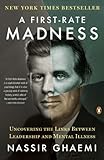Historians have long puzzled over the apparent mental instability of great and terrible leaders alike: Napoleon, Lincoln, Churchill, Hitler, and others. In A First-Rate Madness, Nassir Ghaemi, director of the Mood Disorders Program at Tufts Medical Center, offers a myth-shattering exploration of the powerful connections between mental illness and leadership and sets forth a controversial, compelling thesis: The very qualities that mark those with mood disorders also make for the best leaders in times of crisis. From the importance of Lincoln's "depressive realism" to the lackluster leadership of exceedingly sane men as Neville Chamberlain, A First-Rate Madness overturns many of our most cherished perceptions about greatness and the mind.
[0] https://www.amazon.com/First-Rate-Madness-Uncovering-Between...
http://www.amazon.com/First-Rate-Madness-Uncovering-Between-...


For me, personally, this is the first time in 15 years that I've felt normal, which is to say my entire adult life. Some of that is just growing up, but it took a few tries with psychologists (the second much more successful than the first), being cognizant of what issues put me in a funk and avoiding them, getting the appropriate medication (for depression this is invaluable - the main thing it does for me is make sure those valleys aren't so low) and then within the last year realizing that I might also be adhd (all this shit is comorbid) and seeing a pyschiatrist and getting on the proper meds for that. I know we've got our Scientologists and resident HNers that think the healthcare industry is just a joke, but my counselours have always been my friends, it's as much me guiding and us learning about what works and doesn't work as them, and you know, it's been life-changing. This last part is in response to your "we don't know" comment. We have no fucking clue on the brain works, which is why I'm even saying this. I see people that are ashamed to take medication or admit they have.
But the depression is never going to completely go away. Two books that have given me a lot of hope, taught me a lot are:
> https://www.amazon.com/Lincolns-Melancholy-Depression-Challe...
> https://www.amazon.com/First-Rate-Madness-Uncovering-Between...
I'm sure someone's going to say that here's popsci, but I dunno, was good stuff for me. Great insights into mental disorders and how they can be worked around, even embraced. This is all feeling way too male...I guess a final thing that's been vital for me (and again, just getting older) is the power of empathy. I think there are a few shows like Mad Men or HaCF which really show a variety of people working through issues like this.